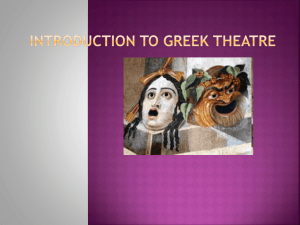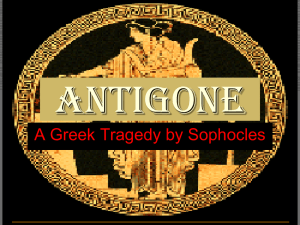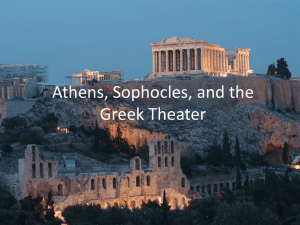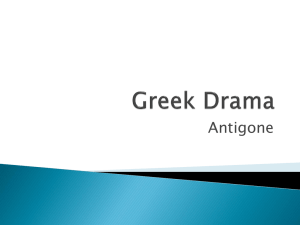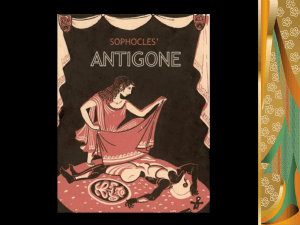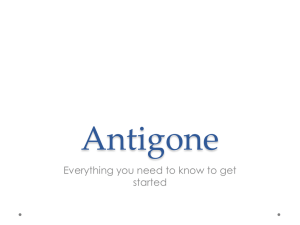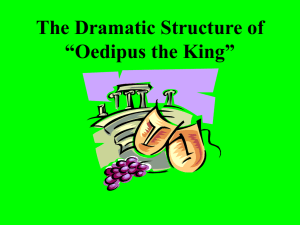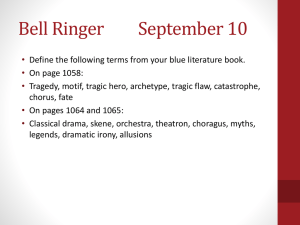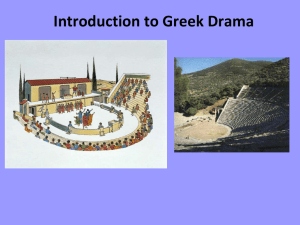Critical Casebook: Sophocles - Chicago High School for Agricultural
advertisement
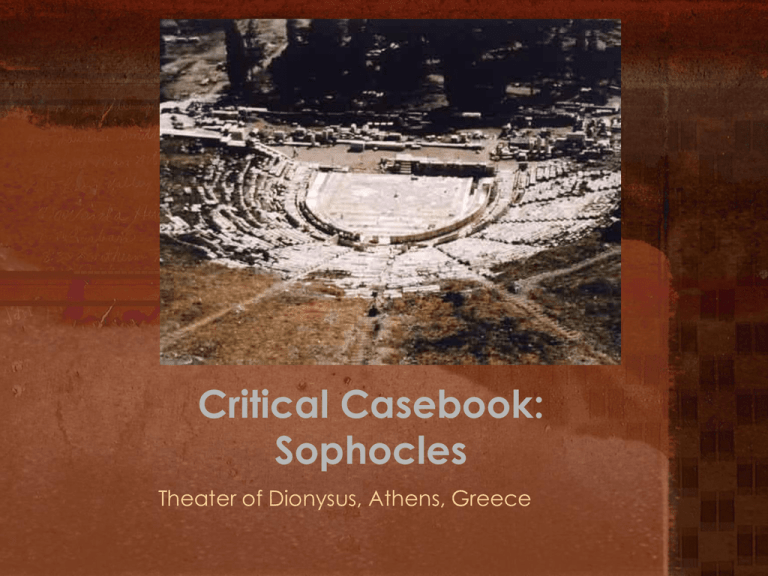
Critical Casebook: Sophocles Theater of Dionysus, Athens, Greece Overview • The Theater of Sophocles • Staging • The Civic Role of Greek Drama • Aristotle’s Concept of Tragedy • Sophocles the Man • The Origins of Oedipus the King • Sketch of Dionysus Theater • Questions for Oedipus the King The Theater of Sophocles • Plays both a religious and civic occasion • Presented only twice a year at religious festivals honoring the god of wine and crops, Dionysus • Comedies were performed in January at the Lenaea festival, the festival of the winepress • Major theatrical event took place in March at the Great Dionysus; city-wide celebration that included sacrifices, prize ceremonies, spectacular processions, and three days of drama The Theater of Sophocles • Each day a different author presented a trilogy of tragic plays • Portrayed some mythic or legendary event • All interrelated • Followed by a satyr play, an obscene parody of a mythic story, performed with chorus dressed as satyrs, or unruly mythic attendants of Dionysus The Theater of Sophocles • Greeks loved competition: plays were no exception • Panel of five judges voted on best play • All plays were written in verse • Substantial cash prize given to winner • Sophocles did not win for Oedipus Rex Staging • As many as 17,000 spectators could watch a performance • Audience arranged in rows • Athenian governing council and military cadets seated in middle rows • Performance space was divided into two parts: the orchestra, a level circular dancing space found at the base, and slightly raised stage built in front of a skene for costume changes Staging • Actors performed primarily on stage • Chorus danced and sang in the orchestra • Skene served as backdrop • Skene had a large door that served as a grand entrance for principal characters • Also used to present tableau • No more than three actors were allowed on stage at any time Staging • The chorus was made up of fifteen people, fixed by Sophocles • Actors spoken monologue alternated with the chorus’ singing and dancing • Tragedy began with a prologue, or preparatory scene • Next came the parados, or song for the entrance of the chorus • Action was enacted in episodes, or acts Staging • Episodes were separated by danced choral songs or odes • The finale was a closing exodus in which the chorus and actors concluded the action and parted • The actors wore masks (personae) which at times were very exaggerated • Representative of characters • To increase dignity and visibility, actors wore cothurni, or high, thick soled elevator shoes The Civic Role of Greek Drama View of the Acropolis The Civic Role of Greek Drama • Athenian drama was financed by the state • Administration of Great Dionysia fell to the head civil magistrate • He annually appointed three choregoi, or producers • Producer had to equip the chorus and rent the rehearsal space • State covered expenses of the theater, actors, and prizes The Civic Role of Greek Drama • Theater tickets were distributed free to citizens; everyone could participate • Theater could hold about half of Athens citizens • Poet’s role was the improvement of the polis, or city-state The Civic Role of Greek Drama • City states sponsored competition between rhapsodes, or public poetry performers • Theater balanced heroism within Homeric epics with the cooperation and compromise necessary for democracy • Challenged audience to feel sympathy for vanquished enemy • Explored problems of the politically powerless The Civic Role of Greek Drama • Some plays depicted men’s toils with women • Others depicted powerful men undone by their own hubris, or judgment • Called for audience to place themselves in the shoes of people very unlike themselves • Meant to enlarge human empathy • Male actors took on principal roles • Chorus many times was made up of female slaves or captives • Plato hated the idea of men playing irrational, jealous, grief-stricken, vengeful Aristotle’s Concept of Tragedy Tragedy is an imitation of an action of high importance, complete and of some amplitude, in language enhanced by distinct and varying beauties; acted not narrated; by means of pity and fear effecting its purgation of these emotions. ---Aristotle, Poetics, Chapter6 Aristotle’s Concept of Tragedy • Protagonist is someone of high estate • Protagonist must fall from power and happiness • This heightens the calamity of his fall and gives him a place of dignity to fall from • Though protagonist is powerful, is not necessarily without grief • The tragic hero is fallible Aristotle’s Concept of Tragedy • His fall is a result of his hamartia, or tragic flaw • Every tragic hero has a weakness, or hubris • Flaw and downfall follow his nature • Downfall results from actions he is responsible for • Audience should feel a sense of purgation, or katharsis, of emotions Aristotle’s Concept of Tragedy • The tragic hero has a moment of recognition, or anagnorisis, or some revelation of some fact not known before or some true identity • The action of the tragic hero turns out to have the opposite effect of the one intended, or reversal (peripeteia) • Audience may delight in seeing tragic character humbled, but also may feel the punishment does not fit the crime (indifferent universe) Sophocles the Man • Lived (496-406 B.C.) • Tragic dramatist, priest, Athenian general • Lived to see his native city-state in decline after the Peloponnesian War • Oedipus the King, his most famous play, is believed to have been produced five years after the plague in Athens The Origins of Oedipus the King • First of the three Theban plays • Can be translated as Clubfoot the Ruler • Also called Oedipus Tyrannos to distinguish it from his last play, Oedipus at Colonus • Oedipus is derived from the word oida, which means “to see” • Oedipus also means “swollen foot” • Tyrannos is a term for anyone who gains power without the help of others Sketch of Dionysus Theater Oedipus Rex Questions 1. How explicitly does the prophet Teiresias reveal the guilt of Oedipus? Does it seem to you stupidity on the part of Oedipus or a defect in Sophocles’ play that the king takes so long to recognize his guilt and to admit to it? 2. How does Oedipus exhibit weakness of character? Point to the lines that reveal him as imperfectly noble in his words, deeds, or treatment of others. Questions 3. “Oedipus is punished not for and fault in himself, but for his ignorance. Not knowing his family history, unable to recognize his parents on sight, he is blameless, and in slaying his father and marrying his mother, he behaves as any sensible persons might behave in the same circumstances”. Do you agree with this interpretation? Questions 4. Besides the predictions of Teiresias, what other foreshadowings of the shepherd’s revelation does the play contain? 5. Consider the character of Iocaste. Is she a flat character---a generalized queen character---or an individual with distinctive traits of personality? Provide evidence from the text. Questions 6. What is dramatic irony? What examples do you find in the play? Do they contribute to the effectiveness of the play? Explain. 7. Violence in the play occurs offstage. Of what advantage or disadvantage to the play is this limitation? 8. For what reason does Oedipus blind himself? What meaning, if any, do you find in his choice of instrument? Questions 9. What are your feelings towards him as the play ends? Justify your answer. 10. How well does Freud explain why the play moves you? Explain. 11. With what attitude toward the gods does the play leave you? By inflicting the plague on Thebes, by causing barrenness, by cursing both the people and their king, do the gods seem cruel, unjust, or tyrannical? Does the play show any reverence towards them? 12. Does the play end in total gloom? Explain.

